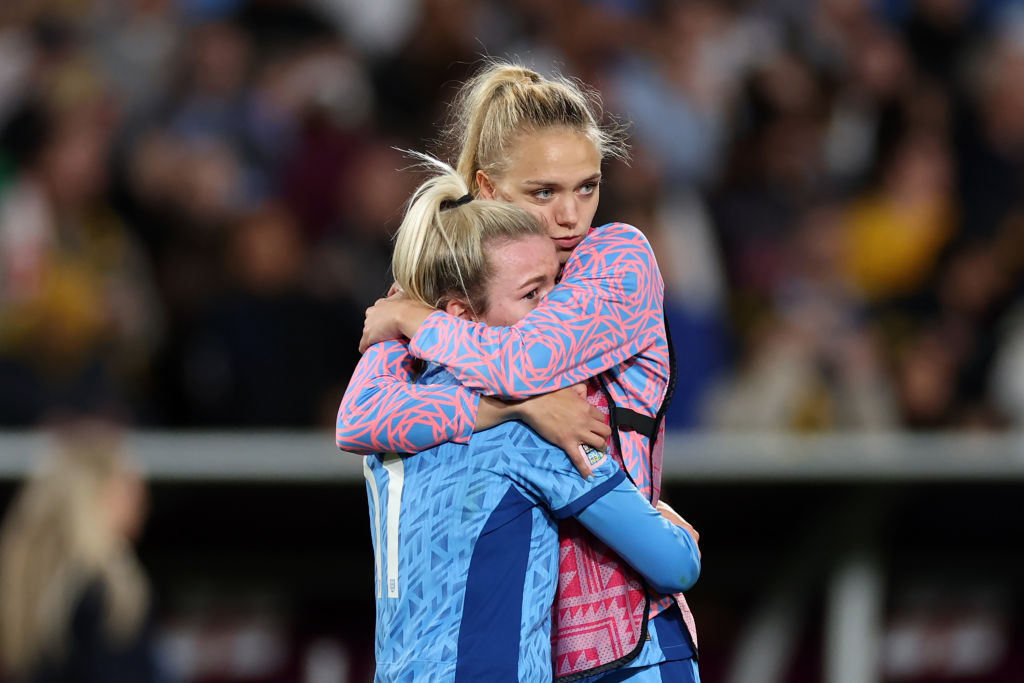
Nothing is promised, nothing is given. If we’re looking for spiritual lessons from an England football team’s first World Cup final in 57 years, that’s probably the first. You can do all the right things – you can upend decades of structural prejudice, invest in the women’s game, hire a deeply empathic and world-class manager, and nurture some of the greatest talents in the history of your sport – and still come second.
You can come second to a team whose own backstory is one of conflict, strife and player rebellion. You can come second to a team whose coach just happens to be the son of the man in charge of Spanish women’s football. It turns out that this World Cup journey wasn’t, in the end, all about you, and your triumph over adversity; it was about someone else’s.
Lifting the trophy would have felt like redemption for either team. No one’s saying that English football deserved its 57 years of hurt – but how fitting, how healing, if it had been women who ended it. Women who were banned, and spurned, and overlooked; women who were patronised, and mocked, and dismissed. Women who could remind us how much it means not just to play for your country, but to get to play at all.
Equality and justice are easy enough to espouse in the abstract, far harder to implement in reality. There will always be a reason why right here, right now, it’s not feasible, not desirable, not urgently necessary, and the history of women’s football has been littered with such excuses. It has had to fight for its right to exist within a sporting environment turned billion-dollar industry that has incubated and showcased the worst excesses of chauvinism and machismo.
Even this week, Fifa’s president, Gianni Infantino, was still making excuses for the sport, even if they were dressed up as maddeningly obtuse encouragement. No doubt he will be the first to argue that Spain’s victory demonstrates that Las 15, the Spanish players who raised concerns about their treatment and were subsequently dropped from the side, had nothing to complain about in the first place.
As for England, there was criticism, before the game, of the Prime Minister and the Prince of Wales – the latter the president of the FA – for failing to attend the final. It seemed entirely misplaced. We shouldn’t be encouraging Rishi Sunak to fart out any more carbon emissions from his private jet than he already does, let alone a round trip of 20,000 miles. But more importantly, does anyone need or want two ultra-privileged men goalhanging around the achievements of women who, in some cases, worked multiple high-street jobs to get there?
The game itself was the blessing. So often World Cup finals are cagey affairs. The weight of the occasion, the height of the stakes, the desperate fear of being the first to concede: these can often combine to ensure that an opening half is dry and uneventful, with neither side prepared to risk their best and freest play.
That wasn’t the case in the Stadium Australia. Even as the game unfolded true to type – Spain beading together their long strings of passes, England threatening cloudbursts of danger at the other end – its dramatic promise was never far away. Everyone knew Salma Paralluelo was going to be fast, and here she was, following up on England’s first corner with a sprint into space down the left side. Everyone said Spain would have the Lionesses’ share of possession, and they used it too, when Lucy Bronze made her first mistake, and Olga Carmona sent a perfect left-footed strike past a compromised Mary Earps.
England had been here before against Spain of course. One-nil down in the quarter-finals of last year’s Euros, they had kept belief and equalised in the 84th minute. Sarina Wiegman is known for bringing pragmatic calm to turbulent situations. But this second half was more fraught than the first, her half-time substitutions failing to work their usual magic and England’s touch in midfield lacking amid the rapid press and pace.
Everyone had worked hard, rightly, to avoid mention of the men’s team, to allow the women their own canvas, free from an undeserved and second-hand inheritance. When Alex Greenwood ran back onto the pitch with her head wrapped liberally in bandages, no one even mentioned Terry Butcher.
But the comparisons in the way we feel are inescapable. We experience the hope and disappointment the same: the panic as the referee jogs to the VAR screens, the encroaching doom as she watches a loop of Keira Walsh’s hand brushing the ball again, and again, and again. The electric jolt of survivor-relief that floods our nervous system when Earps pulls off another incredible save. The same fearful ache that opens yawningly in our stomach, as time begins to run out and another Spanish player falls down clutching her foot.
We knew, from the outset, that there would be tears, we just didn’t know what kind. Certainly the sorrow of losing tastes less bitter when we’ve travelled so far with a team that has given – and taught – us so much. Few of us have watched an England team reach a World Cup final in our lifetime. Now we know: it really is the journey, not the destination, that matters.
This article appears in the 23 Aug 2023 issue of the New Statesman, Inside Britain’s Exclusive Sect





